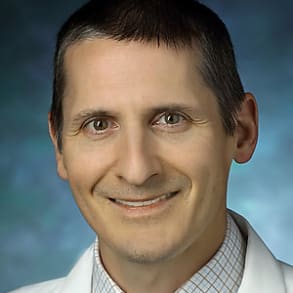Johns Hopkins offers an adult congenital heart disease (CHD) program that helps transition pediatric patients to adult CHD care. Cardiologist Ari Cedars discusses his research on heart failure in adults with CHD. His patient-centered research is focused on patients who were born with CHD and helps them be able to live full lives.
Learn more about the research from our experts at hopkinschildrens.org/heart-research
My name is Ari cedars and I am an associate professor of medicine and pediatrics at johns Hopkins. I'm the head of the adult congenital heart disease program here. I actually have a few research topics uh and uh you could say I'm kind of intellectually promiscuous I guess so. One of my research interests is in heart failure in adults with congenital heart disease and how adults with congenital heart disease, fair after transplant or implant of mechanical circulatory support. Um one is in deep phenotype ng of Fontaine patients in particular. And seeing the ways that the metabolite profile in patients of the Fontaine circulation may interact with their clinical status in impacting their overall care. And finally, I have an interest in patient centered research. Um Specifically I designed an outcome to objectively assess how patients are doing clinically in between visits with hopes that that may help me provide better care to my patients in a way that's really focused on there. The things that are most impor into them like their life at home. Well, I think the motivation for all of our research should be to improve patient's lives, not just the amount of life, but the quality of the life that they have. Most of the patients I see have chronic heart disease and I want to help them live the fullest life possible. So my goal is to improve the lives of the patients I care for. The majority of the research that I'm engaged in is based on interactions I've had with patients. Things that they have mentioned to me or things that they have experienced which have been impactful for me so that I can hopefully help future patients avoid the same consequences of their disease process. I believe the heart center is focused on improving the quality and quantity of life of Children born with, with congenital heart disease. And my research is really on helping those who were born with congenital heart disease and who may have had surgery during childhood live more full lives as adults. Because congenital heart disease doesn't go away when you become 18, there's a full life ahead of you thereafter and it's my job to make sure that life is as full and meaningful as possible.



